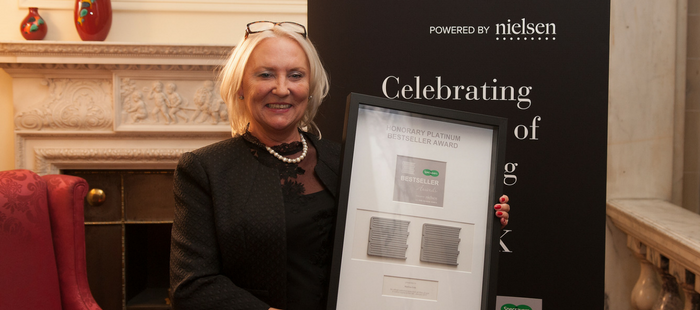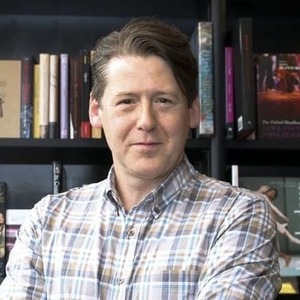You are viewing your 1 free article this month. Login to read more articles.
Martina Cole | 'I was just this blonde from Essex, people didn’t know what to do with me'
You could argue that at their heart, Martina Cole’s novels are primarily about family. Her protagonists more often than not operate on the wrong side of the law, but they adhere to a moral code where protecting those near and dear is paramount. Granted, that code may not be entirely in line with societal norms—defending the family unit may involve, say, beating someone outside the circle of trust to death with a claw hammer—but there is a loyalty there, a devotion to kinship.
It is fitting, then, that Cole and I meet the day after she has had a lunch—a very long lunch, she confides, one that concluded in the wee hours—with her publishing family: the core group at Headline who have published her from day one; her long-time publicist Louise Page; and Darley Anderson, the agent who 25 years ago read her unsolicited manuscript and phoned her immediately saying: “My dear, you are going to be a star.”
Anderson got that right. Cole has shifted £63.2m through BookScan, making her the bestselling British-born crime writer since Nielsen records began, and sixth overall in terms of the top-earning adult fiction authors. Her books have spent a total of 62 weeks atop The Bookseller’s Original Fiction chart in the Nielsen BookScan era—a record. And she continues to attract readers: her autumn 2016 hardback, Betrayal, was around 20% up in sales terms on 2015’s Get Even.
We were at the proposal meeting for Betrayal and [former Headline m.d.] Jane Morpeth said: ‘Of course, 2017 is the 25th anniversary and we have to think about that,’ and it floored me. The relationship with Headline has lasted longer than any of my marriages, I’ll tell you that
“I hadn’t realised it had gone so quickly,” Cole says. “We were at the proposal meeting for Betrayal and [former Headline m.d.] Jane Morpeth said: ‘Of course, 2017 is the 25th anniversary and we have to think about that,’ and it floored me. [The relationship with Headline] has lasted longer than any of my marriages, I’ll tell you that.”
Despite the long night, Cole looks both sprightly and relaxed. She is vaping, sheepishly (“I used to get cross with people who complain about smokers”) and sports a light tan as she is recently returned from North Cyprus, which she decamps to as often as she can; the heat there helps her painful rheumatoid arthritis—not the best ailment to have, she notes wryly, if your job involves a lot of typing or signing books.
She is gearing up for a year of Martina mania in Headline’s Martina Cole 25 Years promotion. The publisher is repackaging her entire backlist during the course of the year into themed strands; in April, her 1992 début, Dangerous Lady, will be re-released in hardback (3,500 free copies will be given to public and prison libraries); a sizeable sum is being ploughed into marketing, including an Evening Standard tie-in which will see the newspaper distribute 75,000 free samplers; and Cole will appear at what Headline calls a series of “major events” across the country. A number of special retailer partners, including Asda, will have dedicated Cole bays, and Headline is linking up with The Works for what will be the chain’s first promotion with the author.
The publisher has not gone into this campaign willy-nilly. It conducted extensive consumer research, gauging opinion across a range of readers, from hardcore fans to those who had never read her. The themed backlist was one result. “We found that a lot of non-Martina readers thought all her books were the same,” explains m.d. Mari Evans. “But they are very different. Having 20-plus titles can be daunting when someone is trying to figure out where to start. So breaking up the backlist into themes such as Strong Women, Family, Prison, creates entry points for new readers.”
Cole says she never planned her career but an ongoing main character was never on the cards: “I just write a book a year. I do love Rebus—Ian’s [Rankin] latest is fabulous. You can’t knock Lee [Child], bless him, he wrote a great book, had the big Tom Cruise film and he deserves all his success. But I would get bored with the same characters in the same period.”
Flying low
That restlessness has made Cole one of the more remarkable crime writers today. Her books may fit largely the same milieu, of the London/Essex criminal underworld, with liberal doses of violence, but her work is varied—from the sprawling family sagas
of Faces and The Family, to the “Godfather”-esque The Graft and The Business, to the taut prison drama of Two Women. Underlying that is sparky dialogue and deft characterisation, underpinned by a clear social commentary. Her characters often have to make their way in the world of crime because other avenues are shut to them, due to class barriers and poverty.
There aren’t many authors at work today who are more feminist. Starting with Maura Ryan, the titular protagonist of Dangerous Lady, a typical Cole heroine is steely strong: smarter than anyone else in the room, more ruthless than her male counterparts and one who will do anything for her family. But you wouldn’t know this from the review pages. For example, apart from a few crime round-up spots, Betrayal was not reviewed by the “quality” papers. This cannot be genre bias; Rankin and Child, for example, are regularly reviewed.
Cole is not really bothered by being snubbed, or is at least inured to it. “I really don’t care what the critics think. But I think if I was a man I would be called the Irvine Welsh of the south-east. There has been a snobbery about me from day one. I was just this blonde from Essex, and because I wasn’t writing chick-lit or about sex, film stars, models or actresses, people didn’t know what to do with me.”
One thing you can say about Cole is that she isn’t a tourist. She writes about the environment where she, in part, came from. She grew up on a council estate in Aveley, Essex, and was a voracious reader—one who, nonetheless loathed school (“my mum made 37 court appearances over 18 months because I was bunking off”).
Early adulthood was tumultuous: she married at 16, divorced at 17, was pregnant at 18. Being a single mum in 1970s Essex was not easy, but she says “it was the best thing that happened to me because I think if it hadn’t happened, I’d have been trapped in that world.” Having to provide for her son, she worked a variety of jobs, writing in her spare time. Her texts from that time include a supernatural novel set during the Great Storm of 1987, and a family saga that stretches from the 1850s to the First World War. She still has those manuscripts and the former may see the light of day—it is currently being pitched to Netflix as a series.
Approaching 30, Cole took a sabbatical from the nursing agency she was working at to write—“they all said: ‘You’re writing a book?’ and laughed at me”—but then she read a manuscript she had written almost a decade previously. She says: “I had a cigarette, a glass of wine and looked it again, and thought: ‘You know what, this is pretty good.’” That book was Dangerous Lady, which she typed up and sent to Anderson.
Cole’s work resonates with a certain segment that powerfully attests to its authenticity: her books are routinely the most borrowed in prison libraries. She has been a long-time ambassador for the The Reading Agency’s Reading Ahead programme, under which she often makes visits to prisons to teach creative writing. She says: “It’s shocking how many people across the UK, and in prisons in particular, can’t write their own name. Books, reading, education in prisons can be a way out of that life. They are banged up, but you shouldn’t send a person out of prison worse than the one you sent in.”
Despite the 25th anniversary, Cole is mostly looking forward. “Like most writers, my favourite book I’ve ever written is the one I’m working on now. But I am proud. I was going to be this one-book wonder and I was dismissed as this Essex girl, but I’m still here all these years later and the books are still selling. That’s all you really want as an author, you know what I mean?”










